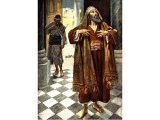 Previous post refers to post-war conflicts between Christians and Pharisees, and cites Morton Smith’s views that this rift lies behind the negative gospel depiction of the Pharisees. I’ve collected here some online articles, based on historical research, that indicate that the gospel’s negative view of the Pharisees is more polemical than historical fact. Historical evidence testifies to the Pharisees being quite popular among the wider public at the time of Jesus. This page is intended to be a companion to the previous post that cites historical evidence locating the Pharisees in Judea with only scant presence in Galilee. for connecting him with the Pharisees.
Previous post refers to post-war conflicts between Christians and Pharisees, and cites Morton Smith’s views that this rift lies behind the negative gospel depiction of the Pharisees. I’ve collected here some online articles, based on historical research, that indicate that the gospel’s negative view of the Pharisees is more polemical than historical fact. Historical evidence testifies to the Pharisees being quite popular among the wider public at the time of Jesus. This page is intended to be a companion to the previous post that cites historical evidence locating the Pharisees in Judea with only scant presence in Galilee. for connecting him with the Pharisees.
Extract:
In sum, then, the Pharisees are not of great interest to Josephus in his thirty volumes of writing. Certainly they do not have the central place of the priestly aristocracy, which is inextricably linked with the admirable Judean constitution throughout all his works. There is no evidence that he identified with the Pharisees in any way. On the contrary, in his world of values they appear on the wrong side entirely. They are for him popular teachers who have the confidence of the masses. But this is no recommendation. He is an unabashed elitist, who thinks that the hereditary priestly aristocracy are the ones properly charged with teaching and caring for the masses. As for many ancient writers, for Josephus the masses are a rudderless, impetuous mob that can be easily led by whoever makes the most convincing appeal to them.
Steve Mason argues that Josephus’s antipathy to the Pharisees is based on personal grudges and should not be taken as support for the negative gospel portrayal. Josephus belonged to the unpopular elite and and saw the Pharisees as historically opposed to his class. Morton Smith in his “Jesus the Magician” (p.156) contrasts the unpopularity of the priests, as witnessed by in one of the “earlier” rabbinic sources, B. Pesahim 57a.
Woe is me because of the House of Boethus,
woe is me because of their slaves.
Woe is me because of the House of Hanan,
woe is me because of their incantations.
Woe is me because of the House of Kathros,
woe is me because of their pens.
Woe is me because of the House of Ishmael, son of Phiabi,
woe is me because of their fists.
For they are the High Priests, and their sons are treasurers, and their sons-in law are trustees, and their servants beat the people with staves.
(Babylonian Talmud, Pesahim 57, 1 Tosefta, Minhot13, 21)
From PACE: Project on Ancient Cultural Enlightenment
Steve Mason
Complete article: Flavius Josephus and the Pharisees
Extract from The Conclusion
Josephus consistently represents the Pharisees as the dominant religious group among the Jews, who had the support of the masses. . . . most important, Josephus’s tendency is to lament the popularity and influence of the Pharisees. But this ongoing lament over Pharisaic predominance would be unnecessary—indeed it would make no sense— if the Pharisees did not hold a dominant position in pre-70 Palestine. Josephus had no discernible reason to invent their popularity, since he regarded it as an unpleasant fact of life.
Brigham Young University Law Review 1993
by Gregory R. Knight
Full article (pdf):The Pharisees and the Sadducees: Rethinking Their Respective Outlooks on Jewish Law
Extract from the Conclusion:
These examples and others demonstrate that the traditional views concerning the Pharisees and Sadducees are somewhat inaccurate. While many examples could be given which demonstrate that the Sadducees were the strict and dogmatic i nterpretationalists and that the Pharisees were the more moderate, flexible group, the point is that in the light of modern scholarship, neither group completely lives up to the sweeping generalizations of the traditional views.
If you enjoyed this post, please consider donating to Vridar. Thanks!
